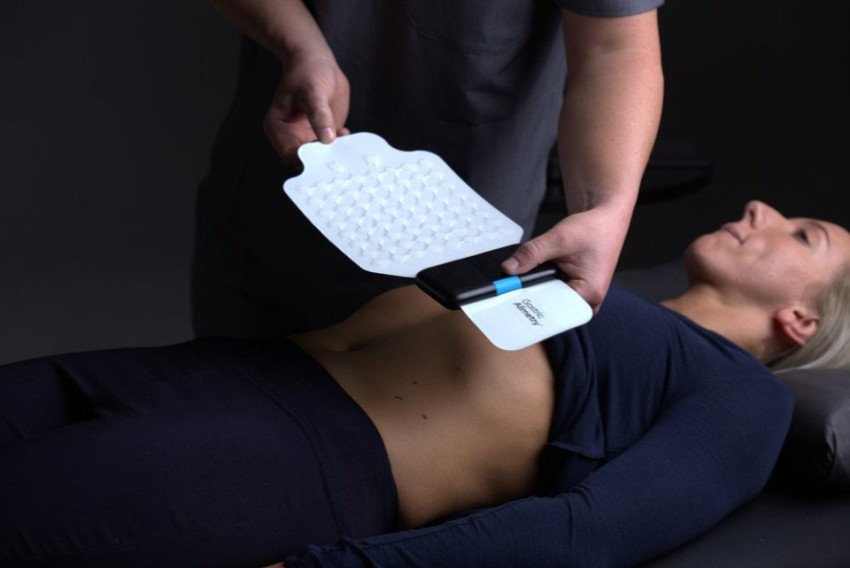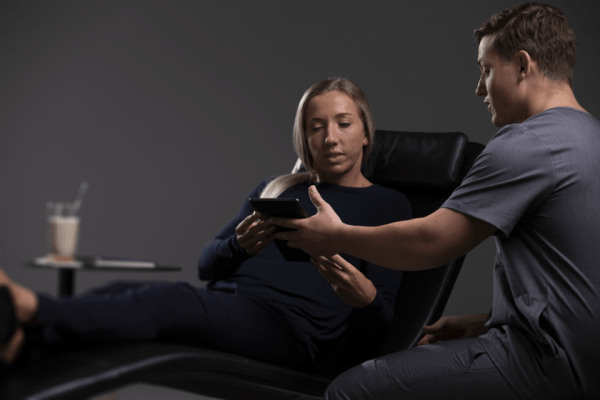Discover our nationwide festival for tech that's good for the world.
Alimetry — decoding the gut
5 December 2023

The adhesive sensor array created by startup Alimetry offers a new way to understand and diagnose gastric dysfunction
At any point in time, one in 10 people worldwide is experiencing the distressing effects of gastric dysfunction. From pain, bloating and vomiting, to difficult bowel movements and body weight changes, symptoms are varied and can be both mild and debilitating
There are plenty of promise-heavy products on the market, with everything from broths to supplements and teas all claiming to ease symptoms. It’s a minefield, but receiving a medical diagnosis isn’t generally much easier. Tests can be costly and invasive (think endoscopies), and even when non-invasive imaging tools are used, results are often inconclusive.
Alimetry is on a mission to revolutionise the gastrointestinal field by decoding the gut. Through their flagship product – a world-first, non-invasive medical device called Gastric Alimetry – doctors can better help patients understand the root cause of their symptoms.
The Auckland-based company’s invention uses an adhesive patch of sensors to pick up on faint electric signals emitted by a patient’s stomach as they digest a meal. Over five hours, a patient records their symptoms in an app on an iPad. Both the electronic readings and the patient’s commentary are analysed by advanced algorithms, turned into a clinical report and presented via the cloud. Then, personalised healthcare can begin.
Co-founder and CEO Greg O’Grady is a business-minded entrepreneur, but he’s also a professor of surgery at Auckland University. Alimetry was born in 2019 off the back of a decade of research at the university. O’Grady and his collaborators were inspired to kickstart the project after seeing flaws in traditional methods of diagnosing gastric disorders. Endoscopies and colonoscopies look at the structure of the gut, but fail to provide intel on how it functions.

When Alimetry CTO and co-founder Armen Gharibans, a biomedical engineer, developed a prototype that worked, the team knew it had global potential.O’Grady left surgery and put his all into the new venture.
In early 2022, they successfully raised $16 million in capital, and the product took off. Now, Gastric Alimetry has FDA approval for the United States market, and is also cleared for clinical use in the United Kingdom and New Zealand.
Long-term, Alimetry’s goal is for their wearable device to do for gastroenterology what ECG (electrocardiograph) testing has done for cardiology.
While the heart’s electric currents are much stronger than the gut’s, the premise of Gastric Alimetry is the same.
But unlike an ECG, that uses a small number of electrodes to monitor the heart’s electric activity, Gastric Alimetry is wireless and high-resolution. The array is a stretchy band with inbuilt electronic sensors. It’s comfortortable for the patient, even allowing them to take rest breaks with ease. Patients can even watch their favourite movie or read a book – a rare treat in a clinical setting.
Alimetry’s contribution to both technology and gastroenterology is being recognised. The company has won a multitude of awards, including three at the 2022 NZ Hi-Tech Awards and the Breakthrough Project Award at the KiwiNet Research Commercialisation Awards. But it’s the tick of approval from notoriously competitive markets such as the US – having a healthcare industry worth more than 4 trillion USD – that speaks volumes for the company’s ability to bring their technology to the world.
Visit Alimetry >
Subscribe to the Techweek newsletter for updates straight to your inbox:
Recent news
Alberta, Canada: A Prime Destination for Kiwi Companies to ‘Land and Expand’
8 May 2024
Invest Alberta in partnership with New Zealand Trade & Enterprise In the heart of the Canadian prairies lies Alberta, a province traditionally known as the country's energy powerhouse.
Selling business solutions to Malaysia's ICT sector
29 Apr 2024
This article was originally posted by myNZTE.
What do tech buyers in Singapore want?
29 Apr 2024
This article was originally posted by myNZTE. Companies in Singapore don't tend to know much about New Zealand's tech offerings, but they are open to them.


